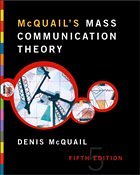OVER 80,000 COPIES SOLD!
The Fifth Edition of this bestselling textbook provides a comprehensive, non-technical introduction to the range of approaches to understanding mass communication. Fully revised, and with new student-friendly features, McQuail's Mass Communication Theory: offers an integrated treatment of the major components of mass communication - the sender, the message, and the audience; considers all the diverse forms of mass communication in contemporary societies - television, radio, newspapers, film, music, the internet and other forms of new media; and demonstrates how theories of mass communication relate to the broader understanding of society and culture.
Thoroughly up-to-date, this new edition includes:
- a glossary of nearly a hundred key terms in media and communication
- additional pedagogical features, such as break out boxes and end of chapter summaries
- more contemporary media examples
The Fifth Edition takes full account of recent theory and research, particularly in relation to new media, globalization and topics related to cultural production (such as advertising, fashion and merchandizing). In this way, McQuail's Mass Communication Theory remains the most integrated and comprehensive introduction to the field.
Table of contents:
PART ONE: PRELIMINARIES
Introduction to the Book
The Rise of Mass Media
PART TWO: THEORIES
Concepts and Models for Mass Communication
Theory of Media and Theory of Society
Mass Communication and Culture
New Media - New Theory?
Normative Theory of Media and Society
PART THREE: STRUCTURES
Media Structure and Performance
Principles and Accountability
Media Economics and Governance
Global Mass Communication
PART FOUR: ORGANIZATIONS
The Media Organization
Pressures and Demands
The Production of Media Culture
PART FIVE: CONTENT
Media Content
Issues, Concepts and Methods of Analysis
Media Genres and Texts
PART SIX: AUDIENCES
Audience Theory and Research Traditions
Audience Formation and Experience
PART SEVEN: EFFECTS
Processes and Models of Media Effects
Socio-Cultural Effects
News, Public Opinion and Political Communication
Epilogue
The Future of Mass Communication
The Fifth Edition of this bestselling textbook provides a comprehensive, non-technical introduction to the range of approaches to understanding mass communication. Fully revised, and with new student-friendly features, McQuail's Mass Communication Theory: offers an integrated treatment of the major components of mass communication - the sender, the message, and the audience; considers all the diverse forms of mass communication in contemporary societies - television, radio, newspapers, film, music, the internet and other forms of new media; and demonstrates how theories of mass communication relate to the broader understanding of society and culture.
Thoroughly up-to-date, this new edition includes:
- a glossary of nearly a hundred key terms in media and communication
- additional pedagogical features, such as break out boxes and end of chapter summaries
- more contemporary media examples
The Fifth Edition takes full account of recent theory and research, particularly in relation to new media, globalization and topics related to cultural production (such as advertising, fashion and merchandizing). In this way, McQuail's Mass Communication Theory remains the most integrated and comprehensive introduction to the field.
Table of contents:
PART ONE: PRELIMINARIES
Introduction to the Book
The Rise of Mass Media
PART TWO: THEORIES
Concepts and Models for Mass Communication
Theory of Media and Theory of Society
Mass Communication and Culture
New Media - New Theory?
Normative Theory of Media and Society
PART THREE: STRUCTURES
Media Structure and Performance
Principles and Accountability
Media Economics and Governance
Global Mass Communication
PART FOUR: ORGANIZATIONS
The Media Organization
Pressures and Demands
The Production of Media Culture
PART FIVE: CONTENT
Media Content
Issues, Concepts and Methods of Analysis
Media Genres and Texts
PART SIX: AUDIENCES
Audience Theory and Research Traditions
Audience Formation and Experience
PART SEVEN: EFFECTS
Processes and Models of Media Effects
Socio-Cultural Effects
News, Public Opinion and Political Communication
Epilogue
The Future of Mass Communication

